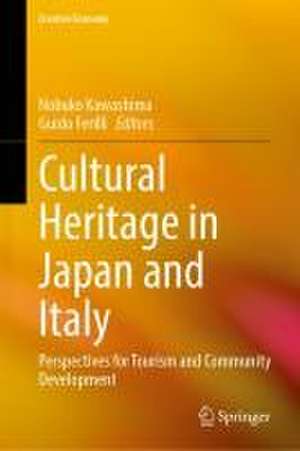Cultural Heritage in Japan and Italy: Perspectives for Tourism and Community Development: Creative Economy
Editat de Nobuko Kawashima, Guido Ferillien Limba Engleză Hardback – 9 apr 2024
Preț: 1001.95 lei
Preț vechi: 1221.90 lei
-18% Nou
Puncte Express: 1503
Preț estimativ în valută:
191.75€ • 199.45$ • 158.30£
191.75€ • 199.45$ • 158.30£
Carte tipărită la comandă
Livrare economică 15-29 aprilie
Preluare comenzi: 021 569.72.76
Specificații
ISBN-13: 9789819714988
ISBN-10: 9819714982
Ilustrații: XI, 207 p. 31 illus., 26 illus. in color.
Dimensiuni: 155 x 235 mm
Greutate: 0.5 kg
Ediția:2024
Editura: Springer Nature Singapore
Colecția Springer
Seria Creative Economy
Locul publicării:Singapore, Singapore
ISBN-10: 9819714982
Ilustrații: XI, 207 p. 31 illus., 26 illus. in color.
Dimensiuni: 155 x 235 mm
Greutate: 0.5 kg
Ediția:2024
Editura: Springer Nature Singapore
Colecția Springer
Seria Creative Economy
Locul publicării:Singapore, Singapore
Cuprins
Introduction: Recent growth of cultural heritage tourism in Japan and Italy.- Recent Development of Cultural Policy in Japan—Emerging instrumentalism for heritage policy.- The Proper Relationship between Preservation and Utilization of Cultural Assets: Recent Trends in Cultural Heritage Protection Policy in Japan.- Lost in Translation: Japan Heritage and the New Direction of Heritage Policy in Japan.-Topics from cultural goods to cultural heritage and its implications regarding theoretical reflection and region-specific Italian policies.- The Value and Utilization of Modern Cultural Heritage in Korea.- Trends and Issues in Japanese Cultural Tourism.- Trends and Issues in Japanese Cultural Tourism Tourist Preferences.- Sustainable Cultural Heritage Preservation: Trail Maintenance Walks in UNESCO World Heritage "Sacred Sites and Pilgrimage Routes in the Kii Mountain Range.- Tourism and theatre: building a new relationship fora new cultural tourism.- Re-imagining italian cultural tourism. Creative economy in the face of crisis and the case of museums and live music.- Cultural heritage for sustainable destination development: the role of collaborative strategies.
Notă biografică
Nobuko Kawashima is a Professor at the Faculty of Economics of Doshisha University in Kyoto, Japan. Her research focuses on the areas of cultural policy, cultural economics and the creative industries. She has extensive experience in policy-making and evaluation at the local and national levels, including chairing the Japanese government’s Council for Cultural Policy Making. Her recent co-edited volumes include Asian Cultural Flows (with Hye-Kyung Lee, Springer, 2018) and Film Policy in a Globlalised Cultural Economy (with John Hill, Routledge, 2017). She is currently writing a book on Japan’s creative and cultural industries analysing their industrial and economic features (Routledge, forthcoming).
Guido Ferilli is Associate Professor and Director of the Cultural Industries and Complexity Observatory at IULM University, Milan. His research focuses upon economics, data science, and European programmes. He researches and consults internationally in the fields ofcultural economics policy design and regional development. He has a wide international experience in coordinating research and policy design projects.
Guido Ferilli is Associate Professor and Director of the Cultural Industries and Complexity Observatory at IULM University, Milan. His research focuses upon economics, data science, and European programmes. He researches and consults internationally in the fields ofcultural economics policy design and regional development. He has a wide international experience in coordinating research and policy design projects.
Textul de pe ultima copertă
This edited book represents one of the first scholarly research through an international collaboration project between Japan and Italy to address economic and social values of cultural heritage beyond its inherent—historic, archaeological, or aesthetic—values. Cultural policies in the world have over the decades expanded to include non-cultural purposes such as economic development and social inclusion. Japanese cultural policy for heritage is catching up on this trend: we have seen major shifts of emphasis from preservation for its sake to the utilisation of cultural heritage for the purposes of tourism, place branding, local vitalization and community-building, whilst Italy has long thrived on the economy of heritage tourism and more cases are being seen for urban and regional development with the use of cultural assets. The recent outbreak of Covid-19 and the problem of over-tourism that preceded it have challenged tourism policy and practice in the two countries.
This book identifies emerging trends, issues, and problems in such policy shifts. The book breaks a new ground in the bourgeoning studies of tourism, heritage, and cultural policy by adopting an international, inter-disciplinary approach. The chapters on Japan in particular make an original contribution to these fields in the English literature in which discussion of Japan despite its economic and cultural presence on the globe has hitherto been less available.
Caracteristici
Analyzes various policy issues related to heritage tourism in Japan and Italy Covers economic and social values of cultural heritage in Japan and Italy Addresses the impact of COVID-19 on heritage tourism policy









